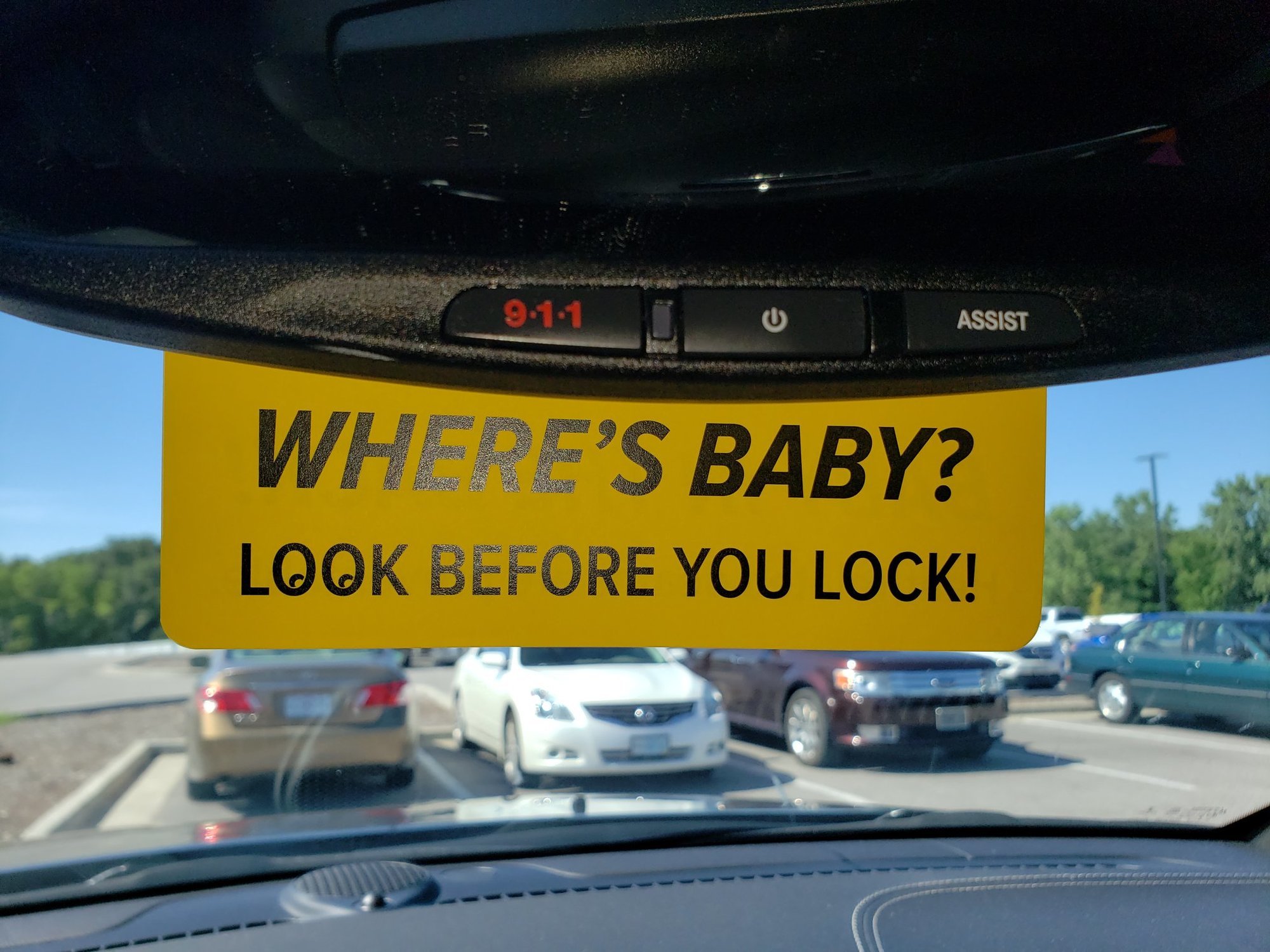
Each year, just as the weather starts to heat up and summer's officially in full swing, the same tragic headlines start rolling in. A parent absentmindedly leaves a sleeping baby in the back seat on a warm day, or a toddler slips into the family vehicle when no one's looking. Whatever the case, accidental hot car deaths are a scary reminder of what can happen when children are left unattended in the heat, even for short periods of time. According to a new report, 15 children have died in hot cars in 2019 alone — and the summer has just barely begun. To help prevent even more from happening, police in Missouri have devised a simple, yet helpful reminder for parents to always check the back seat before leaving the car.
In a June 25 Facebook post, the O'Fallon Missouri Police Department announced it would be giving away free rearview mirror tags to the public
"In the continuing effort to provide the best level of service possible to our residents, the OPD is offering these rearview mirror reminders to ensure your most prized possession is safe," the post read.
The yellow tags, which can be affixed to the rearview mirror of any standard car, come with two messages: "Where's baby? Look before you lock!" and "Baby in the back! Heat-related deaths are preventable."
Each offer reminders to the parent before stepping out of the car, as well as others, who may be passing by the vehicle. Presumably, parents would remove the rearview mirror tag once they take the baby out of the car, and place it back again once they're ready to drive off, as a visual reminder. If they don't, passersby would hopefully be alerted to the possibility of a child inside the car, once they spotted the bright yellow tag in the front of the car, which reads, "Baby in the back!"
The mirror tags aren't just helpful -- they could be life-saving, when you consider how easily these deaths can happen.
The rate of hot car deaths may be small in comparison to the number of other vehicle-related deaths, but as the OPD reminds us, they are 100 percent preventable. And tragically, since the OPD first posted its announcement on Facebook, two more children would sadly die of heatstroke inside a hot car.
The most recent case involved a 3-year-old from Morristown, Tennessee, who was found dead last week after being reported missing by his parents. The toddler's body was tragically found inside the family minivan, which had been parked in the driveway of his home.
While no foul play is suspected at this time, an autopsy report is still pending, Knox News reports.
"We think he got in on his own and was just unable to get out," a spokesperson for the local police department shared.
Still, many other hot car deaths begin with something many parents live in fear of: A simple case of forgetfulness that ultimately leads to tragedy.
Such was the case for Kristie Reeves-Cavaliero and her husband, Brett, who lost their infant daughter Sophia "Ray Ray" in 2017.
As Kristie shared with NBC News, it happened on the kind of day we all have from time to time: baby Sophia — who by that point had become the family alarm clock — randomly overslept, which then caused her parents to oversleep, and run late to work. The morning was then thrown into the kind of rushed chaos we're all familiar with, except for one small mistake that triggered a tragic chain of events: Instead of dropping Ray Ray off at day care, Brett absentmindedly drove straight to work — and forgot about his sleeping baby in the back seat.
“That morning he took a right-hand turn instead of a left," Reeves-Cavaliero said, looking back. "And so our tragedy started with one single wrong turn."
The infant was found hours later in the back of Brett's car, dead of what first responders later found to be heat-related illness. Both parents were shocked and grief-stricken. How could a mistake like that be made?
And yet, it's a mistake that happens to dozens of parents each year.
On average, 37 children will die of heatstroke each year after being forgotten in a car by a parent or becoming trapped in one.
Dr. David Diamond, a professor of psychology at the University of South Florida, has been studying what some have dubbed "Forgotten Baby Syndrome" for years. And while it may not be what most parents want to hear, Diamond spoke plainly with NBC News when he said, "Any person is capable of forgetting their child."
If that statement shocks you, you're not alone. But after speaking with dozens of parents who have lost their child in this way, Diamond says he's noticed certain patterns that seem to connect most of their stories.
“When you drive home and don’t normally take a child to day care, when you have a habit and you are normally driving home from work — and in those subsets or maybe none at all take a child home — well, what happens in all these cases, the parent goes into autopilot mode, which is typically from home to work," Diamond explained.
According to Diamond, these simple, yet tragic missteps can be traced back to basic brain function. Though we move through our days basically unaware, our hippocampus (our main brain center for holding new and incoming information) is in constant competition with the basal ganglia, the part of the brain that allows us to go on auto-pilot or, say, remember how to ride a bike even if it's been years.
"It’s in that subset of cases the basal ganglia is taking you on a route that does not include a child," Diamond explained.
In Missouri, officials hope the new mirror tags will help alert parents who might find themselves in a similar situation.
After all, how many of us have slipped into a daydream as we drove, or lost focus in the chaos of the day — especially in moments of stress or sleep deprivation? Add into the mix a quiet or sleeping child who may be easy to overlook in the back seat, and it suddenly becomes a bit easier to see how it could happen to even the most conscientious parent.
On Facebook, users were quick to praise the police department's efforts.
"What a wonderful idea and making it available to the public is awesome," wrote one user. "Children are our most precious gifts that we have been allowed to watch over, guide and protect."
While there were some critical comments left on the post — as well as some that criticized how "sad" it was that a product like this would even need to exist — many were merely grateful that it does.
"I can't believe the negative comments and the overconfidence that some people could never forget," wrote one person. "Departure from the normal routine, especially when stressed about something, is when mistakes happen … The decals may save a baby. Thanks for providing them."




